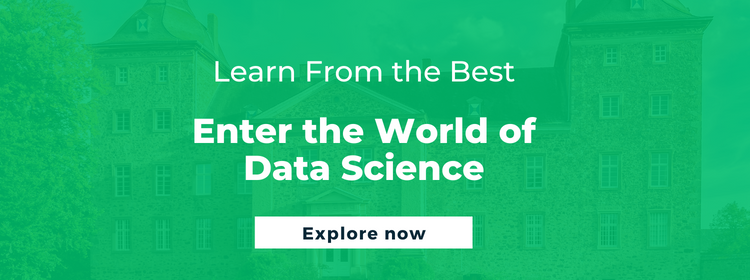How to Build a Successful Career in Data Science and Analytics?

- What is Data Science and Data Analytics?
- What is the Difference Between Data Science and Analytics?
- What Qualifications are Required for a Career in Data Science and Analytics?
- What are the Career Prospects in Data Science and Analytics?
- What Skills are Essential to Excel in a Career in Data Science and Analytics?
- How to Get Started with a Career in Data Science and Analytics
- What is the Job Market Like for Data Science and Analytics Professionals?
- What are the Different Types of Roles in Data Science and Analytics?
- What Does the Year 2023 Have in Store for Data Science and Analytics?
- Upskill Data Science and Analytical Skills with Emeritus
Data science and analytics are at the forefront of leveraging the power of data. This field is gaining a lot of momentum currently. In fact, the number of data scientist jobs in the U.S. is expected to grow 36% until 2031. Consequently, there is a high demand for skilled data experts. By using advanced data analytics techniques, data scientists can uncover patterns and insights that can help businesses to stay ahead of the competition. Moreover, the data science domain incorporates a wide array of tools and techniques that enable companies to gain insights from large and intricate data sets. This article, therefore, is meant to be a comprehensive guide on this topic. It delves into the fundamental concepts of data science, looks at real-world applications, and sheds light on career prospects.
What is Data Science and Data Analytics?
Data science and analytics have become two of the most widely used terms in technology and business. However, there is often confusion about the differences between these two fields and how they relate. Data science draws on various areas such as computer science, statistics, mathematics, and domain expertise to generate insights from structured, semi-structured, and unstructured data. Additionally, data scientists use various techniques to preprocess data, such as data cleaning, data transformation, and feature engineering. They then use statistical and machine learning algorithms to build predictive models and make data-driven decisions. Data analytics, on the other hand, is a subset of data science. It focuses on using data to identify trends and patterns. It also involves collecting and analyzing data to extract insights that can inform business decisions. Finally, data analysts use various tools and techniques to process and analyze data, such as SQL queries, Excel spreadsheets, and data visualization software.
What is the Difference Between Data Science and Analytics?
 Data science and data analytics are two related but distinct fields often used interchangeably. Here are some valuable pointers explaining their difference.
Data science and data analytics are two related but distinct fields often used interchangeably. Here are some valuable pointers explaining their difference.
| Basis of Difference | Data Science | Data Analytics |
|---|---|---|
| Use | Uses a combination of statistics, mathematics, computer science, and domain expertise to extract insights from data. It is mainly used for solving complex problems and creating predictive models using data | Uses statistical methods and tools to analyze data and draw insights from it. Furthermore, analytics is used for answering specific questions and identifying patterns in data to help make better business decisions |
| Approach | Data science is a more exploratory and iterative process than analytics, which tends to follow a more linear and structured approach. Besides, It often involves working with large, unstructured data sets | Analytics may also involve smaller, more structured data sets |
| Focus | Data science is often focused on driving innovation as well as creating new products | Analytics is more focused on optimizing existing processes. Additionally, it improves business outcomes as well |
ALSO READ: Key Differences Between Data Analyst and Data Scientist: Which Role is Better?
What Qualifications are Required for a Career in Data Science and Analytics?
It’s important to note that the specific qualifications and requirements for data science and analytics positions can vary depending on the industry and organization. However, having a combination of technical and analytical skills and effective communication and experience can provide a strong foundation for pursuing a career in this field. Here are some qualifications that can help in pursuing a career in data science and analytics.
Bachelor’s Degree
Many data science and analytics positions require at least a bachelor’s in a related field, such as Computer Science, Mathematics, Statistics, Engineering, or Economics.
Master’s Degree
A master’s in Data Science, Analytics, or a related field can provide more specialized knowledge and skills. Furthermore, these are beneficial for pursuing advanced positions in the field.
Certifications
Certifications such as Certified Analytics Professional (CAP), Cloudera Certified Data Analyst (CCDA), and SAS Certified Big Data Professional can also demonstrate proficiency in specific tools and technologies used in data science and analytics.
ALSO READ: How to Build a Successful Career in Business Analysis: An Overview
What are the Career Prospects in Data Science and Analytics?
Undoubtedly, the data science and analytics field is rapidly expanding, offering a promising career path with excellent prospects. Additionally, the demand for skilled professionals in this field has grown exponentially over the past decade, and this trend is expected to continue. Many organizations across healthcare, finance, marketing, e-commerce, and social media hire data science and analytics professionals to derive insights from their data and make data-driven decisions. Moreover, with the right skills and training, individuals can pursue a fulfilling career in data science and analytics.
What Skills are Essential to Excel in a Career in Data Science and Analytics?
By developing and refining the skills mentioned below, individuals can position themselves for success in a career in data science and analytics.
Programming
PProgramming allows individuals to automate repetitive tasks, enabling them to work more efficiently and effectively. Therefore, proficiency in programming languages such as Python, R, and SQL is necessary for data manipulation, visualization, and analysis is very useful. Also, experience with statistical analysis, machine learning algorithms, goes a long way in this field.
Analytical Skills
Identifying patterns and trends in data is also essential in data science and analytics. Along with that is the ability to solve complex problems using data-driven insights.
Communication Skills
Effectively communicating insights and findings to technical and non-technical stakeholders is also essential.
Statistical Analysis
A thorough understanding of statistical concepts is necessary for data analysis and modeling. This is because it allows data scientists and analysts to extract meaningful insights from data.
Machine Learning
Familiarity with machine learning algorithms, techniques, and tools is also crucial. Firstly, it enables the development of predictive models to make accurate predictions and recommendations based on complex data sets. Secondly, machine learning techniques provide efficient methods for identifying patterns and trends in large data sets.
Data Visualization
The ability to create compelling and informative visualizations is essential for presenting insights. It not only helps communicate complex data sets concisely to technical and non-technical stakeholders, it also provides an efficient means of identifying patterns and trends in data.
How to Get Started with a Career in Data Science and Analytics
Here are some useful steps that one should follow to build a career in the domain of data science and analytics.
Develop a Strong Foundation in Mathematics and Statistics
Mathematics and statistics are the foundation of data science and analytics. Furthermore, it is essential to have a good understanding of calculus, linear algebra, probability, and statistics to excel in this field.
Learn Programming Languages
As mentioned above, learning programming languages is an important skill to develop for all data-related activities. Learning these languages can help one work with large data sets. Additionally, it can help businesses to build machine-learning models.
Gain Practical Experience
Practice is vital to learning data science and analytics. Begin with minor projects and progress to big ones. Follow that by participating in online competitions, hackathons, and data science challenges to gain practical experience.
Pursue a Degree or Certification
A degree in significant domains such as data science, computer science, or statistics can provide a solid foundation for a career in data science and analytics. Besides, many universities offer degree programs in data science. Online courses and certifications are also available, which are great for upskilling.
Network with Professionals
Networking is crucial in any career, including data science and analytics. One should attend events such as industry conferences and meet-ups to connect with other professionals in the field. Moreover, one can also join online communities and forums to connect with like-minded individuals.
Follow the Most Recent Trends and Technologies
Data science and analytics are constantly evolving fields. Professionals should therefore stay updated with the latest trends, technologies, and tools to remain competitive in the job market. Furthermore, it is also essential to subscribe to industry newsletters, blogs, and podcasts to stay on top of the latest news and developments.
What is the Job Market Like for Data Science and Analytics Professionals?
There has been an exponential growth of data in recent times. This, in turn, has led to more organizations relying on data insights to make informed decisions. As a result, the job market is up-and-coming for data science and analytics professionals. Furthermore, employment in the overall domain of data analysis is anticipated to increase by 16% by 2028. Clearly, the opportunities are plenty, and the future looks promising too.
What are the Different Types of Roles in Data Science and Analytics?
 Job roles in data science and analytics are vast and constantly growing. Here are some potential career paths and job roles in this field.
Job roles in data science and analytics are vast and constantly growing. Here are some potential career paths and job roles in this field.
Data Scientist
Data scientists can translate raw data into actionable insights to provide data-driven recommendations.
Responsibilities
- Using techniques to build machine learning models and algorithms
- Secondly, analyzing and interpreting complex data sets
- Finally, communicating the findings to stakeholders and making recommendations based on data insights
Average Salary: $106,104 a year
Data Analyst
Data analysts meticulously examine data, uncover trends, and create reports that help businesses make informed decisions.
Responsibilities
- Scrutinizing and studying the data to identify trends
- Next, preparing reports and visualizations to communicate insights to stakeholders
- Lastly, collaborating with teams to improve data quality and accuracy
Average Salary: $74,342 a year
ALSO READ: Top 10 Technical Skills to Get a High-Paying Data Analyst Job
Business Intelligence Analyst
Business intelligence analysts optimize business performance and empower organizations to thrive in a dynamic market landscape.
Responsibilities
- Developing and maintaining dashboards and reports for business stakeholders
- Identifying and analyzing key performance indicators to improve business decision-making
- Lastly, implementing data governance and data quality initiatives
Average Salary: $68,000 to $93,000 per year
Data Engineer
A data engineer can ensure seamless data flow from various sources, transforming it into a usable format.
Responsibilities
- Designing and building data pipelines to collect and store data from various sources
- Optimizing databases and data warehouses for performance and scalability
- Moreover, collaborating with data scientists and analysts to ensure data availability and quality
Average Salary: $109,675 a year
Machine Learning Engineer
Machine learning engineers can design and implement robust machine learning systems, enabling organizations to harness the power of artificial intelligence.
Responsibilities
- Creating and maintaining machine learning models
- Also, optimizing models for accuracy and scalability
- Finally, collaborating with data scientists and engineers to deploy models into production
Average Salary: $75,352 a year
What Does the Year 2023 Have in Store for Data Science and Analytics?
As we approach the middle of 2023, the data science and analytics field is expected to continue its rapid growth and evolution. Additionally, with the increasing demand for data science and analytics professionals, the job market is expected to remain strong with lucrative salaries. Furthermore, advancing technologies such as machine learning and artificial intelligence will also drive the need for skilled professionals. Besides, a growing focus on ethical and responsible data practices may lead to new job roles and responsibilities. As data science and analytics continue to shape and transform various industries, it is an exciting time for professionals in this field to stay ahead of the curve and make meaningful contributions to their organizations.
Upskill Data Science and Analytical Skills with Emeritus
Emeritus offers data science courses that are designed for potential learners and professionals. What’s more important is that these courses are taught by experienced faculty members and industry experts who have extensive knowledge and practical experience in data science and analytics. The best part? Learners can also access career services, such as career coaching, job placement assistance, and networking opportunities.
Write to us at contact@emeritus.org
















